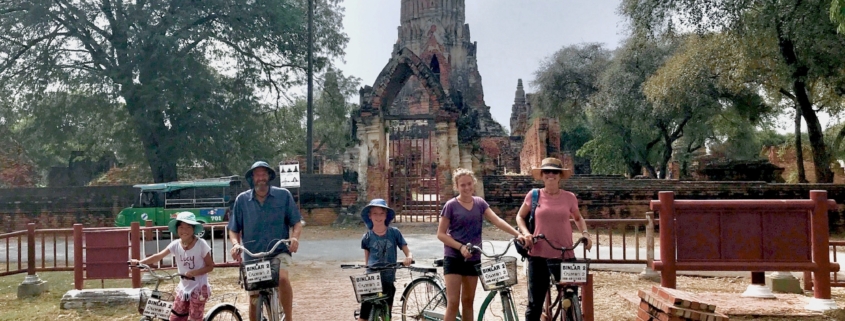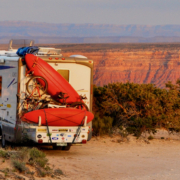How Do Families Afford Long-Term Travel?
One of the essential questions about long-term travel is how do families afford it? In this post, we’ll explore the different avenues to solve the riddle. The short answer is this: it’s different for everyone. The longer answer is that it usually requires trade offs and a variety of resources to pay for extended time on the road.
Our research shows that worldschooling travel budgets vary enormously. Your cash flow needs will reflect your family’s values and priorities. They will depend on what kind of travelers you are, where you choose to go, whether you travel fast or slow, your preferred accommodation types, and other cost/comfort/convenience trade-offs. Lots of families travel on lean budgets and find creative ways to make it work. So, don’t let the question of how to pay for long-term travel and worldschooling stop you from pursuing your dream.
Families often use a mix of resources to afford their worldschooling journey. Some of the most-cited ways of paying for long-term travel include:
Savings
Saving money is the most straightforward way to fund family travel, but that doesn’t mean it is the easiest. Once you’ve made the decision, setting a savings goal, will likely require new trade-offs. Look at what is optional and what you are willing to give up. Remember, you’re making those trades so your family can follow the dream you share.
Investment
Some families use the financial markets to generate income for their travels. Others invest in rental properties to generate income. If you plan to use investments to pay for travel, we encourage you to talk with a financial advisor to ensure you are comfortable with the associated risks and trade-offs.
Selling Belongings
Some people love their stuff and have every intention of returning to it after their travels. Others feel ready to let some of their things go. Selling belongings can yield money for travels, plus you’ll save on storage costs. Remember to be aware of what you might have to replace after you return home.
Leveraging Your Residence
If you own your home, you might decide to sell it and use any profits to help pay for travel. Another option is to rent out your property, generating income to fund your trip and help cover expenses at home. Arranging long-term rentals via sites like furnishedfinder.com is often the easiest approach, as there are fewer turnovers and less wear on the property. Short-term rentals usually earn more on a per-night basis but are more labor intensive. You might want to work with a property manager to help with logistics.
House Swaps
An increasing number of travelers are participating in house swaps. A house (or home) swap is residing in another family’s home while they live in yours. You create an online listing for your home with available dates, then look for places you’re interested in staying and coordinate details with the other party for a temporary exchange of homes. There are several online services that facilitate matches, including homeexchange.com and lovehomeswap.com.
House Sitting
Even if you don’t have or wish to offer a home in exchange, house sitting can be a way to cover some accommodation costs. In this arrangement, property owners offer reduced or free accommodation in their vacant home in exchange for care of their pets, livestock, gardens, house, or other property. House sitters also help keep the property safer, as an empty home is more tempting to thieves and maintenance issues can otherwise go unchecked. Housesittingmagazine.com is a helpful resource for house sitters around the globe.
Couch Hopping
Couchsurfing is another option for families looking to reduce travel expenses. This term refers to staying overnight in other people’s homes for free. Couchsurfing can include visits with friends and family, but it often refers to residing with people you don’t know before your stay. This approach may not be for everyone given potential safety concerns. But for those interested, couchsurfing.com or a quick online search of “couchsurfing with kids” will provide a good starting point for the latest trends and resources.
Using Points and Miles
Wise use of credit cards prior to and during your trip can help accumulate miles toward travel, accommodations, and cash-back rewards. As soon as possible, start using cards favorable to travel that earn points. There may be bonuses for opening a new account, reaching certain levels of spending, or referring friends to the program. For example, milesmomma.com and thepointsguy.com offer news, tips, deals and reviews to help maximize reward travel.
Working on the Road
It’s not all about saving a buck or selling assets or finding every deal possible to seed your budget. In fact, many families afford long-term travel by working on the road.
Location-dependent Work
Some travelers work in roles that require them to be in a fixed location some of the time. Project-based work, seasonal roles, and consulting engagements such as campground hosting, teaching positions, or sabbatical research assignments often have clear start and end dates. Families staying in one place for a while often “live lean” during that time, saving large portions of their income toward future travel periods.
Digital Nomadism
An increasing number of employees and entrepreneurs can be location independent. Your employer might be willing to work out a flexible work arrangement for your current position. Consulting and contract work, online teaching and tutoring, selling goods, providing information technology services, and many other roles lend themselves well to this setup.
Take Your Skills with You
You may have transferable job skills as a teacher, doctor, fitness instructor, nurse, or arborist. These skills are needed throughout the world. For this reason, some families build their journey around wherever the next job takes them, using locally earned income to fund slow travel. They immerse themselves in new communities. Sites such as Workaway allow hosts to recruit workers who can babysit, garden, cook, build, or provide other services in exchange for accommodation and wages, and often both parties benefit from cultural exchange.
We share more about creative ways for families to afford long-term travel in our book–Wonder Year: A Guide to Long-Term Family Travel and Worldschooling–available this September. Pre-orders are available at the links on this website.














